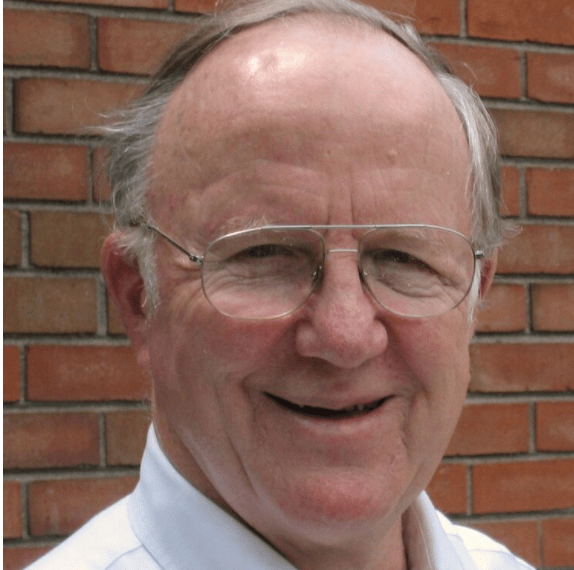In 2016, Fletcher Lowe emailed me out of the blue. He wanted to meet Episcopalians who were going to be at the 2016 Faith and Work Summit in Dallas, and a chain of emails had led him to me and Will Messenger at the Theology of Work Project. (Will and I are both Episcopal priests, as was Fletcher.)

We exchanged phone numbers and planned to meet at the opening reception. Fletcher promptly got off of the plane and, as I recall (my saved email fails me on the details), broke his foot. He had to get right back on the plane and go home to Virginia. We never met in person.
Our near-miss, however, led him to invite me and others from TOW to get on a Zoom call (in 2016!) to connect the work of the Episcopal faith and work group Fletcher headed (then called Episcopalians on Baptismal Mission and now Partners for Baptismal Living), to more evangelical faith-and-work efforts represented by the Summit. After a couple of fruitful discussions, Fletcher invited me to join the periodic conference calls held by the Steering Committee of EBM. I would say this was an afterthought, except that I don’t think Fletcher had afterthoughts. He was a master of intentionality.
I never really agreed to be a “Steer” – as he always addressed us in his convening emails – I just never really agreed not to be. Fletcher kept emailing me and I kept showing up for the conference calls and Zoom meetings. The group was always looking for more diversity on the steering committee, and while a middle-aged middle-class white lady is not that diverse, at that point I was the only Steer younger than the boomer generation, and (while I always describe myself as doctrinally orthodox but not culturally evangelical) I had connections in more evangelical parts of the church than many. Fletcher always welcomed me warmly to our discussions.
It’s hard to capture Fletcher’s enthusiasm in words. His obituary will give you a bit of an idea – I am exhausted just reading everything he started, most of which he managed to finish. He always began our calls by checking in with us and asking how we were doing and how we were working for justice and equity in our own corners of the world. (As he had worked deeply and carefully to help his parish reckon with their legacy regarding Robert E. Lee, I wish I could have heard what he would have said knowing he was being buried on the same day the Lee statue in Richmond came down.)
He had a grand vision to make Episcopalians overcome our deeply ingrained clericalism, and he would do that by any possible means. He would talk to anybody. He wrote a book (more on that in a minute). He worked informally through relationship-building; he worked bureaucratically through pushing for changes to our canons (for non-Anglicans in the house, canons are essentially the rules of how we run the church.) I didn’t even realize until I read his obituary that he was the driving force behind allowing Episcopal laypeople to assist with the distribution of bread and wine at the Eucharist and to take communion to shut-ins, two things that I take completely for granted as a priest in the 21st century. In Anglicanism, you can argue about polity and theology all day long but it really matters when you start changing the liturgy. Fletcher mattered. Fletcher thought people mattered. Fletcher thought people outside the church walls mattered.

Sometime between the foot-breaking incident and the Chicago Summit in 2018, Fletcher sent me the book he’d co-authored with another Steer, Demi Prentiss: Radical Sending. I read it, and then I was supposed to review it for this blog. I never did – I had two small children and several jobs, and life (and eventually a pandemic) got in the way. (When I opened it to write this reflection, I found my 2018 room key from the Hyatt inside of it.) I do not in the least think that Fletcher would mind that I briefly reviewed his and Demi’s book while writing a eulogy for him.
It’s a very good book. It uses one of his favorite metaphors – that of the church as “base camp” which sends out hikers/disciples to transform the world – and it looks at this theologically and practically. It deals honestly with the kinds of resistance that will emerge when you try to point out that the church doesn’t just belong to the clergy. It has lots of interviews with churches who have learned to radically send their people, and with laypeople in these churches who have learned to live out their baptismal covenant in their daily life and work. It has wonderful appendices with all sorts of plug-and-play stuff for the local congregation. You should read it.
We lost Fletcher on August 25, twelve hours after he wrote a perfectly marvelous and quintessentially Fletcher blog post which you should also go read, concluding:
[F]or some of us, the Dismissal at the end of worship is the most important part of the Sunday Liturgy. What are the hymns and readings and prayers and sermons all about but helping “equip the saints for the work of ministry.” (Ephesians 4:12) Preparing for the launch, getting the fuel for the journey, being supplied for the hike.
Fletcher planned his own funeral, a wonderful affirmation of his faith – of the church’s faith – in Jesus Christ who empowers the faithful in their daily work, who guides us as we walk (OK, Fletcher, hike) on our daily journey, who raises the dead and promises a new heaven and a new earth. The brief note he composed for the beginning of the bulletin is worth quoting in full:
To my family and friends. Thank you for joining in this service of thanksgiving to God for the life God has given to me. Believing as I do in the Risen Lord Jesus Christ, I know that there is life after [death] and that death comes as another event in my continuing life with Christ; that, as through Baptism, I have died and risen with Christ, so my death comes as part of that Baptismal journey. Thus this memorial service speaks rather to Easter than Good Friday, to a risen Lord, not a deceased prophet.
To my interfaith friends: I welcome you to this, my last earthly hurrah and I thank you for being present. That this service is clearly from my Christian tradition should not surprise you. We have been at our best when we have most fully lived within our own Faith tradition- and through the strength of those commitments, we have joined together in a united voice for the God of justice. As always, Peace, Shalom and Salaam, Fletcher.
Peace, Fletcher. I hope someday to see you face to face when I too have hiked to the top of the mountain.

Beautiful tribute, Jennifer!
LikeLike